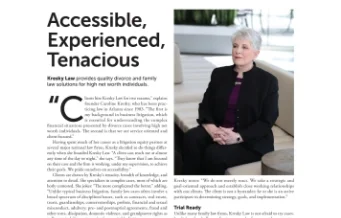Divorce
Like all other states, Georgia recognizes no-fault divorce. This means that one does not have to prove the other party did something wrong to cause the divorce. Instead, it is sufficient to claim that the marriage is “irretrievably broken,” which does not imply either spouse is to blame for causing the marriage to break down. In addition to dissolving the marriage, the court will make final, enforceable orders regarding matters such as the equitable division of marital property, temporary or permanent alimony, and child custody and child support, if applicable. Either the parties can come together and draft an agreement on how these matters will be handled, or if they are contested, the issues will be decided by the judge following a courtroom hearing. Either way, Kresky Law can help ensure that your rights are protected and your best interests are promoted in a marital settlement agreement or litigation. Our firm represents individuals throughout Atlanta in all manner of divorce cases, including those involving high net worth, business ownership, and other complex financial matters.
Georgia Divorce Process
A “total divorce” in Georgia dissolves the marriage contract, leaving each party with the right to remarry, and restoring maiden or prior names if requested. Divorce cases are heard in Superior Court by a judge unless a jury trial is demanded and the circumstances support a request for trial by jury. Both Fulton County and DeKalb County maintain alternative dispute resolution (ADR) programs, and the judge overseeing the case can order the parties into mediation or other ADR methods prior to trial for a contested divorce.
Georgia courts have jurisdiction over a divorce case if either spouse has been a resident of the state for at least six months. The petition filed with the court will describe how the residency requirement has been met and also include the date of marriage and separation, the names and ages of any minor children, the statutory ground alleged for the divorce, and the property and earnings of each party for purposes of determining alimony or the equitable division of marital property.
The other spouse in response can demand a detailed statement of the facts on which the grounds for divorce are predicated, present defenses, and ask the judge for a divorce in their favor. Filing a counterclaim is not required.
Unless the case is settled through a marital agreement, it proceeds like other civil matters in court, with the parties filing pleadings and motions, going through discovery, and proceeding to trial. At trial, the court will receive evidence and legal arguments regarding contested matters, such as alimony, property division, custody and support. A no-fault divorce cannot be granted until at least 30 days from the date the petition is served on the other party, although the process will likely take longer.
Grounds for Divorce
The vast majority of divorces are based on the no-fault ground that the marriage is irretrievably broken, sometimes referred to as “irreconcilable differences.” Many states have done away with fault grounds altogether, but they still exist in Georgia and are still sometimes used. Fault grounds in Georgia include:
- Intermarriage by persons within the prohibited degrees of consanguinity or affinity;
- Mental incapacity at the time of the marriage;
- Impotency at the time of the marriage;
- Force, menace, duress, or fraud in obtaining the marriage;
- Pregnancy of the wife by a man other than the husband, at the time of the marriage, unknown to the husband;
- Adultery in either of the parties after marriage;
- Willful and continued desertion by either of the parties for the term of one year;
- Conviction for an offense involving moral turpitude with a prison sentence of two years or more;
- Habitual intoxication;
- Cruel treatment as defined in the law;
- Incurable mental illness;
- Habitual drug addiction.
Fault grounds are sometimes used because they can impact alimony payments, or because it is important to one spouse’s emotional health to prove that the other party was at fault in causing the breakdown of the marriage. Fault grounds must be proven in court, and the other party might challenge those grounds. Applicable defenses to fault grounds can include collusion or consent to the conduct by the other party, allegations that both parties are guilty of like conduct, or evidence that the other party condoned the behavior and continued to cohabit with the allegedly guilty spouse.
Caroline Kresky is an experienced litigator with years of courtroom expertise who prosecutes or defends against fault grounds in appropriate cases. Even if fault is not proven, it is still possible to get a divorce on no-fault grounds.
Contact Kresky Law for Help With Divorce in Atlanta
If you are considering filing for divorce or if you have been served with divorce papers by your spouse, Kresky Law can provide you with practical advice and effective advocacy to make sure the divorce concludes in your best interests. We can help you achieve your goals and move forward in a new chapter of your life with security and confidence.


